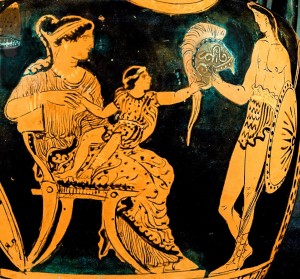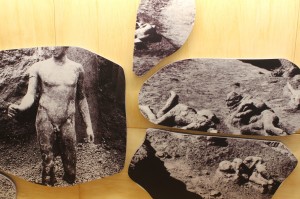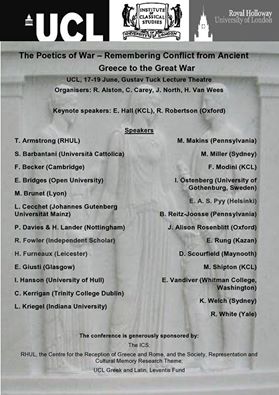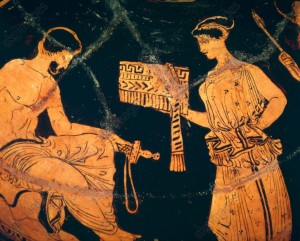Saturday 21st November 2015, 9.30am-6pm at Roehampton University
Organisers: Alessandra Abbattista (Roehampton) [email protected] and Eleanor Betts (OU): [email protected]
We are pleased to announce that registration for Multitudo is now open. This one-day workshop brings together postgraduate students and early career researchers interested in taking a multidisciplinary approach to sensory studies of Greek and Roman societies. The objective of the workshop is to explore the value of applying sensory approaches to the material and literary evidence of the ancient world, and to illustrate how they complement and/or contradict each other. In particular, the workshop will demonstrate a range of methodologies and approaches which may be applied to different literary and archaeological contexts, with a focus on how empirical sensory data may combine, or at times conflict, with that of ancient sources.
There is no fee for attending the workshop, but all attendants must register. Please do register via https://www.eventbrite.co.uk/e/multitudo-tickets-18818572858. The deadline for registration is the 15th of November. We welcome a participative audience and with the support of the Classical Association are pleased to be able to offer a small number of student bursaries to eligible presenters and participants. If you would like to be considered for a bursary, please send a request to Alessandra Abbattista ([email protected]) or Eleanor Betts ([email protected]), indicating your status and the cost of your travel and/or accommodation expenses, when you register for the workshop.
We are keen to attract undergraduate, MA and PhD students to the workshop, from Classical Studies and other disciplines, so please advertise it as widely as you can. If using Twitter, please use the hashtag #multitudo15.
The full programme and registration details are available on our website:
http://sensorystudiesinantiquity.com/2015/09/28/multitudo-a-multisensory-multilayered-and-multidirectional-approach-to-classical-studies/
See also: http://www.roehampton.ac.uk/Courses/Humanities/Calendar—Humanities/Workshop—Multitudo–a-multisensory,-multilayered-and-multidirectional-approach-to-classical-studies/
For further information please do not hesitate to contact us: Alessandra Abbattista ([email protected]) or Eleanor Betts ([email protected]).
Programme:
9.30-10 Registration and coffee
10-10.10 Introduction: Alessandra Abbattista & Eleanor Betts
Panel 1: Embodied Performance
Chair: Eleanor Betts
10.10-10.50
Alessandra Abbattista & Giacomo Savani
“The Multisensory Metamorphosis of a Thracian King”
Metamorphosis – ancient Greek tragedy – funeral mourning – myth of Procne
Fabio Lo Piparo
“Blowing Through the Gorgon Mask: a Reading of the Cassandra Episode in Aeschylus’ Agamemnon”
Aeschylus’ Agamemnon – Cassandra – aulos – Gorgon mask – Tony Harrison’s Oresteia
10.50-11.30
Helen Slaney
“Kinaesthesia as Methodology”
Dance – sculpture – movement – aesthetics – reception – cognition – enactment – embodiment – haptic – tactility – interactive
Anna Trostnikova
“Multisensory Experience of Audiences at Roman Religious Festivals. Spectators or Participants?”
Theatre – collective experience – ritual vs performance – lex iulia theatralis – crowd behaviour – production of space
11.30-11.40 Coffee
Panel 2: Smell, Taste and Touch
Chair: Giacomo Savani
11.40-12.20
Catherine Hoggarth
“Crossing the Multisensory Bridge”
bridges – urban – rural – multisensory – multidisciplinary – risk – comparative approaches – value – reconstruction – methodologies
Stuart McKie
“Practical Magic: How, Where and When to Curse a Thief in Roman Britain”
Magic – Roman Britain – curse tablets – ritual – experimental archaeology – movement – gesture
12.20-1.00
Marta Garcia-Morcillo
“Feeling the Market in Ancient Rome”
Smell – hearing – product recognition – competition – social status – performance – interaction – atmosphere – daily life
Patty Baker
“Tasting Roman Food: Experimental Archaeology”
Taste – senses – reenactment – experimental archaeology – recipes – environmental remains
1.00-1.40 Lunch
Panel 3: Sights and Sounds
Chair: Alessandra Abbattista
1.40-2.20
Orestis Mitintzis
“Visual Aspects in the Experience of Pilgrimage in the Ancient Greek World”
Pilgrimage – pilgrim – sight – nature – sanctuary – buildings – votives – cult statue – Classical and Hellenistic world
Matteo Olivieri
“The Song of the Maidens of Delos: Homage to the Identities of the Pilgrims of Apollo?”
Delos – sanctuary – religious festival – cult – regional sanctuary – Apollo, Artemis and Leto – Delian Maidens – Homeric hymn to Apollo – choral lyric – mimetic performance – dance – ethnic identity – polis identity – Ionian – Cyclades islands – Aegean sea – Greek language & dialects
2.20-3.00
Francesca Berlinzani
“An Acoustic Problem of the Ps. Aristot. ΠΕΡΙ ΦΩΝΗΣ. Between Auditive and Visuospatial Perception”
Ancient acoustics – Aristotle – formants – echo – resonance – sound perception
Jeff Veitch
“Hearing Architecture: Sound Samples in Architectural Context”
aural architecture – acoustics – sound perception – Roman buildings – sound samples
3.00-3.30
Jasmine Parker & Eleanor Betts
“A Phenomenology of Visual Perception”
3.30-3.40 Coffee
Panel 4: Theorising the Senses
Chair: Jeff Veitch
3.40-4.20
John Harrison
“The Stourhead Temple of the Nymph: a Multisensory Experience”
Grotto – Stourhead – nymphaeum – multisensory – synaesthesia – kinaesthesia – vision – audition – olfaction – thermoception
Hannah Platts
“Sensing and Feeling at Home: Multisensory Approaches to the Roman Domestic Realm”
Multisensory – insula – domestic – home – status – identity (belonging) – Roman
4.20-5.00
Kelli Rudolph
“Method and Theory in Ancient Sensory Studies”
Ancient methodologies: analogy – polarity – inference – theoretical positions: status of qualities – the relations between contraries – notions of elements; understanding of ancient approaches to study of the senses
Emma-Jayne Graham
“Objective Senses and Sensory Objectives in the Graeco-Roman World”
Objective/subjective senses – texts/materials – metaphor/experience – perception/description
5.00-5.20 Closing discussion
5.20-6.00 Drinks reception
 In societies where the threat of armed conflict was an ever-present element of the political and social experience, the impact of war was acutely felt by the immediate families of those whose role it was to train for and engage in combat. This conference aims to explore the roles and experiences of military families (defined here as the nuclear family of soldier, partner and children) in the ancient world and to situate these within the wider context of the history of such families. We therefore welcome offers of papers on any aspect of military families in the ancient world as well as comparative studies which consider more recent historical contexts.
In societies where the threat of armed conflict was an ever-present element of the political and social experience, the impact of war was acutely felt by the immediate families of those whose role it was to train for and engage in combat. This conference aims to explore the roles and experiences of military families (defined here as the nuclear family of soldier, partner and children) in the ancient world and to situate these within the wider context of the history of such families. We therefore welcome offers of papers on any aspect of military families in the ancient world as well as comparative studies which consider more recent historical contexts.

 The close of the meeting brought deservedly warm applause for the organisers, and especially
The close of the meeting brought deservedly warm applause for the organisers, and especially